Culture and Tourism Theme-Related Twelve Hours Oil Paintings
At the end of 2019, Shaoxing culture and Tourism theme related oil paintings "Twelve Hours" series made a dazzling appearance in Shaoxing. The organizers also made the cultural and creative products- the oil painting-like postcards and handed them out among the visitors as a gift. People loved it so much and spoke highly of it.
"Twelve Hours" Oil Painting Postcards Exhibition
"Twelve Hours" Oil Painting Postcard Released
“Hour” is a timing unit in ancient China. One hour in ancient China is equal to two hours now. The “Twelve Hours” are named after the “Twelve Earthly Branches”, they are respectively “Zi, Chou, Yin, Mao, Chen, Si, Wu, Wei, Shen, You, Xu and Hai”. “Zi” refers to the period of time beginning from 11 o’clock to 1 o’clock at midnight. And “Wu” refers to the period of time beginning from 11 o’clock to 1 o’ clock at noon. Chinese people match the “Twelve Earthly Branches” with the “Twelve Zodiac Animals”to form the “Chinese Zodiac Sign”, namely, Zishu, Chouniu, Yinhu, Maotu, Chenlong, Sishe, Wuma, Weiyang, Shenhou, Youji, Xugou and Haizhu, symbolizing the year in which a person is born,
In 2019, a Chinese TV drama titled "Chang'an Twelve Hours" made a hit. The inspiration of "Twelve Hours" oil painting exhibition just came from it.
Appreciate "Twelve Hours" Oil Paintings
Mao(05:00-07:00)
Enjoy the View of Zhenhe River under the Yuewang Terrace
In the early morning, stepping down from the Fu Shan, a scenic spot which is located in the center of the ancient city that Emperor Gojian of the State of Yue reigned more than 2,500 years ago, you will see what the locals do when dawn breaks every day. Standing on the Baozhu Bridge which is hundreds of years old in Cangqiao Street, you can enjoy the sound of sculling in the the faint dawn.
Chen (07:00-09:00)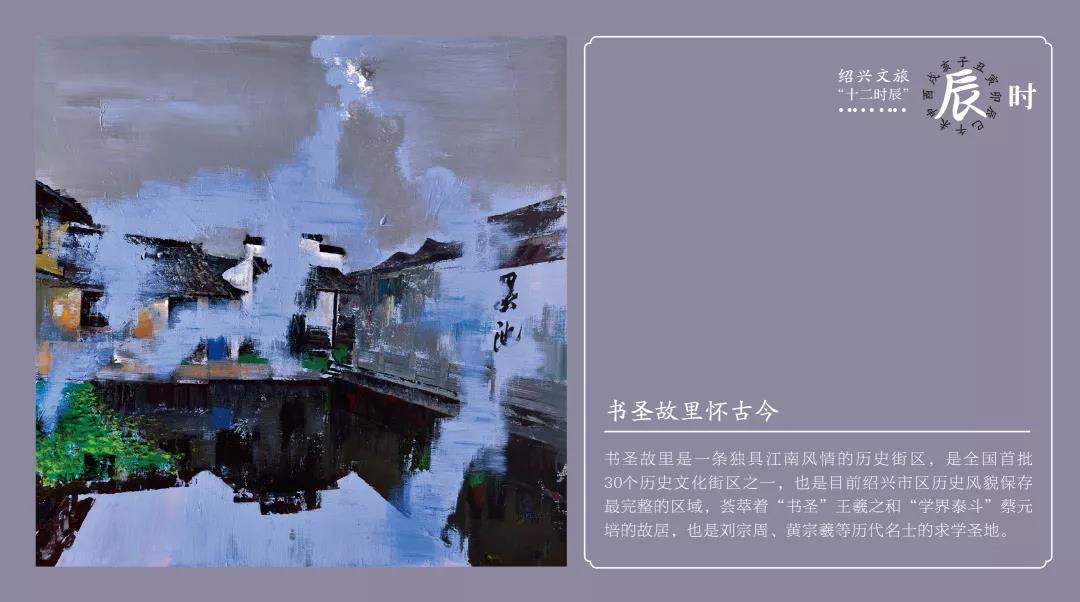
Reminisce at the Former Residence of the Sage of Calligraphy
Former Residence of the Sage of Calligraphy is a historical block with unique Jiangnan characteristics. It is one of the first 30 historical and cultural blocks in the country and also the best-preserved historical area in Shaoxing City so far. Shaoxing celebrities such as Wang Xizhi, the "Sage of the Calligraphy" and Cai Yuanpei, the "top scholar", who influenced the development of Chinese culture, had ever lived here. Celebrities of different ages such as Liu Zongzhou and Huang Zongxi had ever studied here. It was taken as a scared place for learning.
Si (09: 00-11: 00)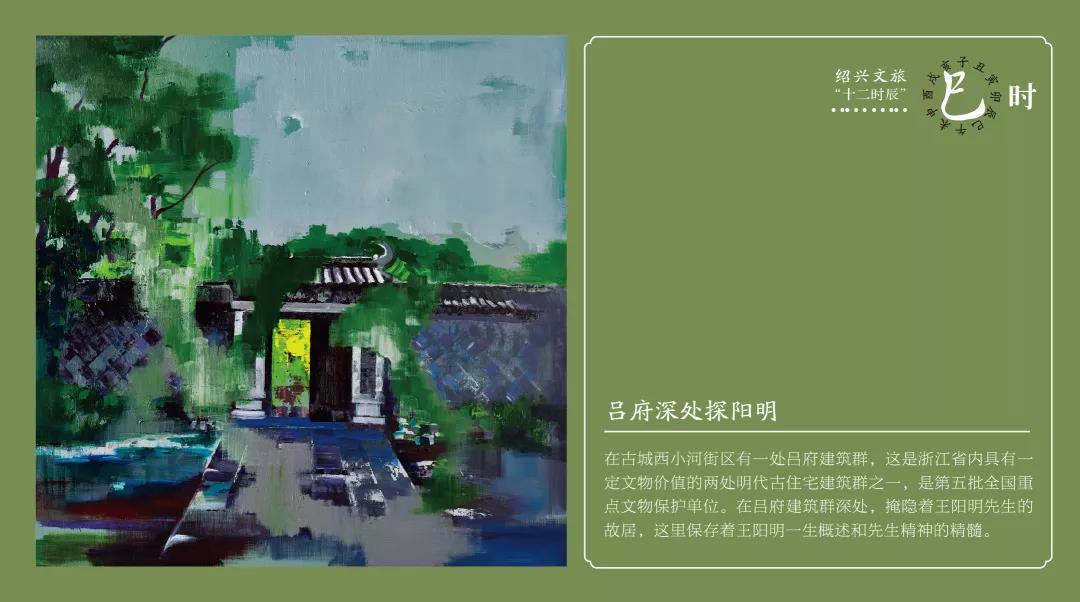
Explore Yangming Culture at the Mansion of Family Lv
In Zhejiang Province, there are two ancient residential buildings of Ming Dynasties and the Mansion of Family Lv is one of the two. It is located in Xixiaohe historical District in this ancient city and preserved well as cultural relics of great value. The Mansion of Family Lv has been selected as the fifth batch of national key cultural relics preservation units. Deep in the building complex, sits the Wang Yangming’s Former Residence where Wang Yangming's life stories and the essence of his spirit are recorded and kept well.
Wu (11: 00-13: 00)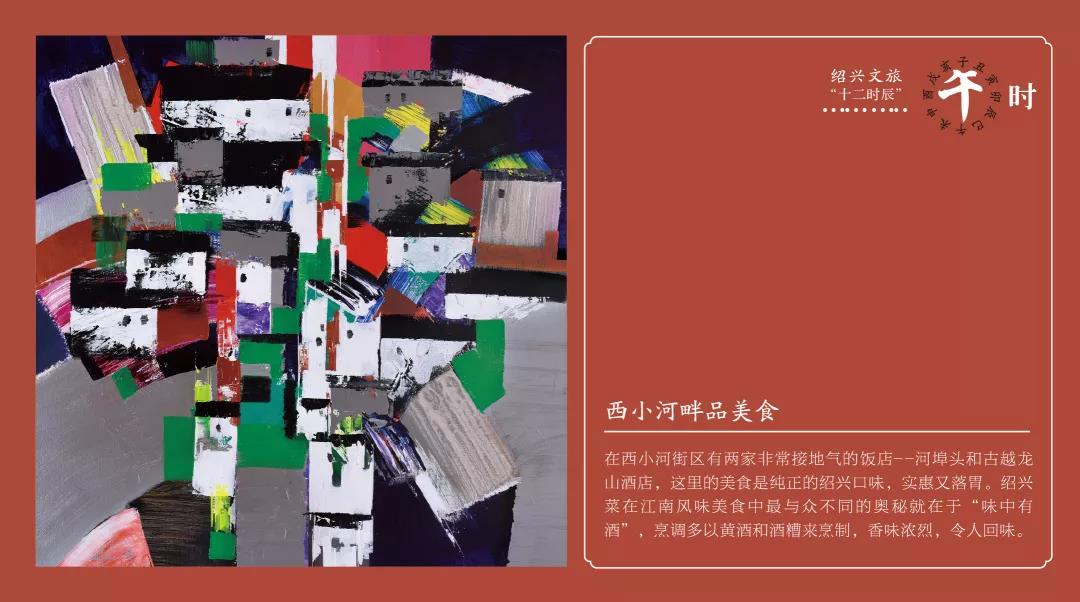
Taste Delicious Food at Xixiaohe District
There are two hotels in Xixiaohe District- Hebutou and Guyue Longshan Hotel, which are frequently visited by the locals. The food in the hotel is purely Shaoxing flavored, affordable and tasty. The secret of the delicious Shaoxing cuisine lies in the “rice wine”. It is the rice wine that makes Shaoxing cuisine so distinctive in Jiangnan. People get used to cooking the food with the rice wine or vinasse so that the food smells nice.
Wei (13:00-15:00)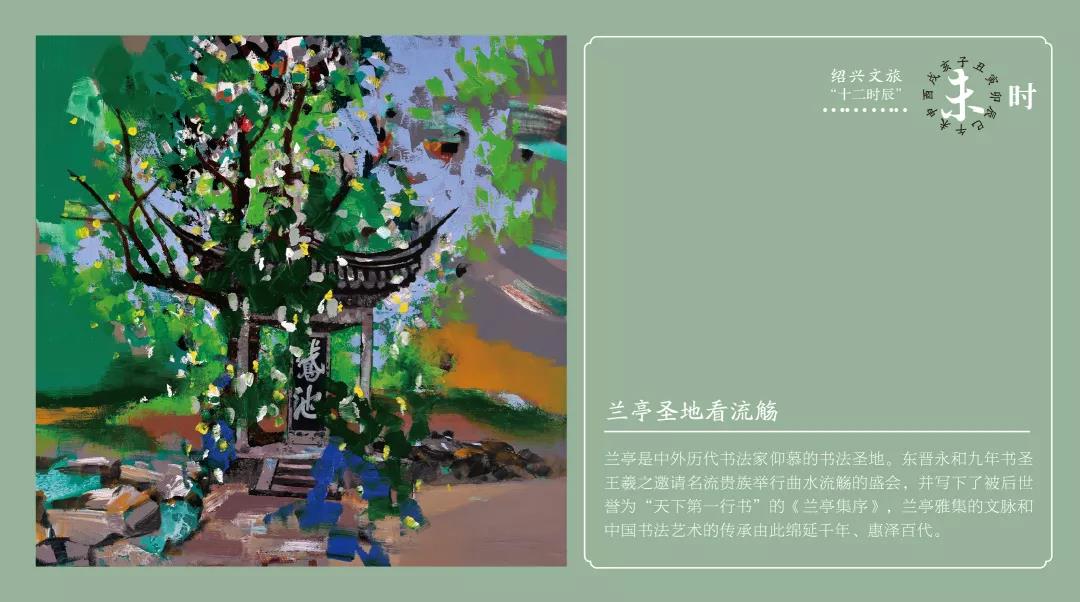
Enjoy the Scenery of Floating Wine Cup Along the Winding Water in Orchid Pavilion
The Orchid Pavilion is a sacred place of calligraphy admired by calligraphers of all ages at home and abroad. On the third day of the third lunar month in the ninth year of the Yonghe period of the Jin Dynasty, Wang Xizhi and forty-one men of letters gathered at the Orchid Pavilion to “wash away dirt in the river”. It was an old custom to rid oneself of ill omens. The men sat by the river and put their cups full of wine into the water, letting them float downstream. Wherever a cup stopped, the person sitting closest to the cup would immediately compose a poem, otherwise he had to drink three cups of wine as penalty. During this gathering, twenty-six people composed thirty-seven poems. Wang Xizhi wrote the preface for the Collection of Orchid Pavilion Poems on the spot with his beautiful calligraphy, adding fame to the Orchid Pavilion over the history. The context of the Orchid Pavilion Collection and the Chinese calligraphy art have been inherited since then and benefited the later generations.
Shen (15: 00-17: 00)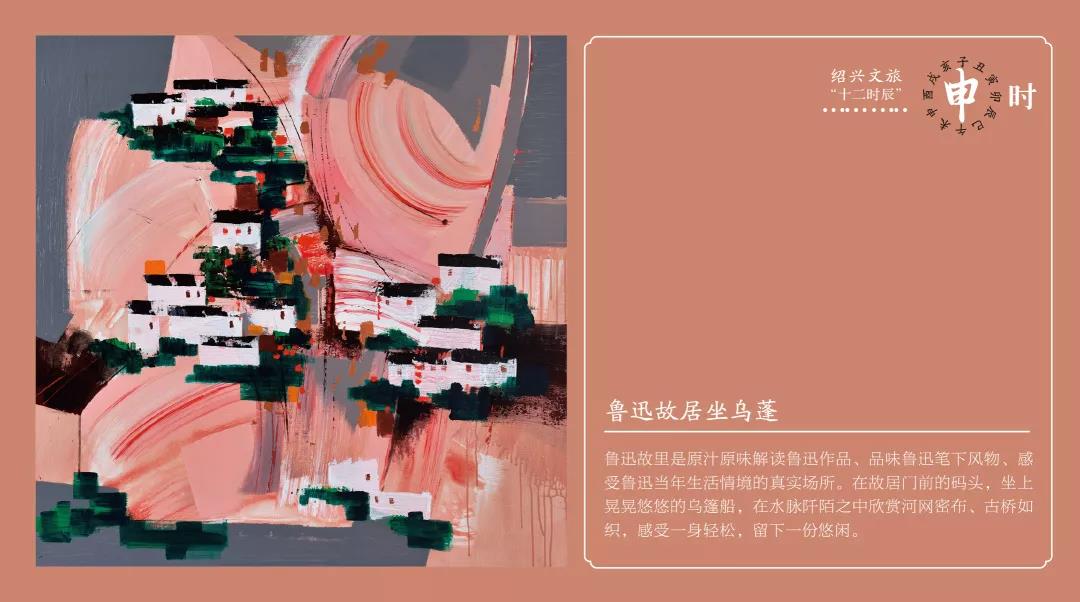
Take pleasure by Wupeng Boat at Lu Xun's Former Residence
Lu Xun's Former Residence Provides an authentic cultural context to interpret Lu Xun's works, understanding what Lu Xun wrote, and feel what Lu Xun felt in his time. In the front gate of Lu Xun’s former residence, there is a dock where I got on the Wupeng boat, old-styled shed boat, and felt relaxed as if you were boating in a picture in which there are many beautiful and enchanting rivers and ancient bridges.
You (17: 00-19: 00)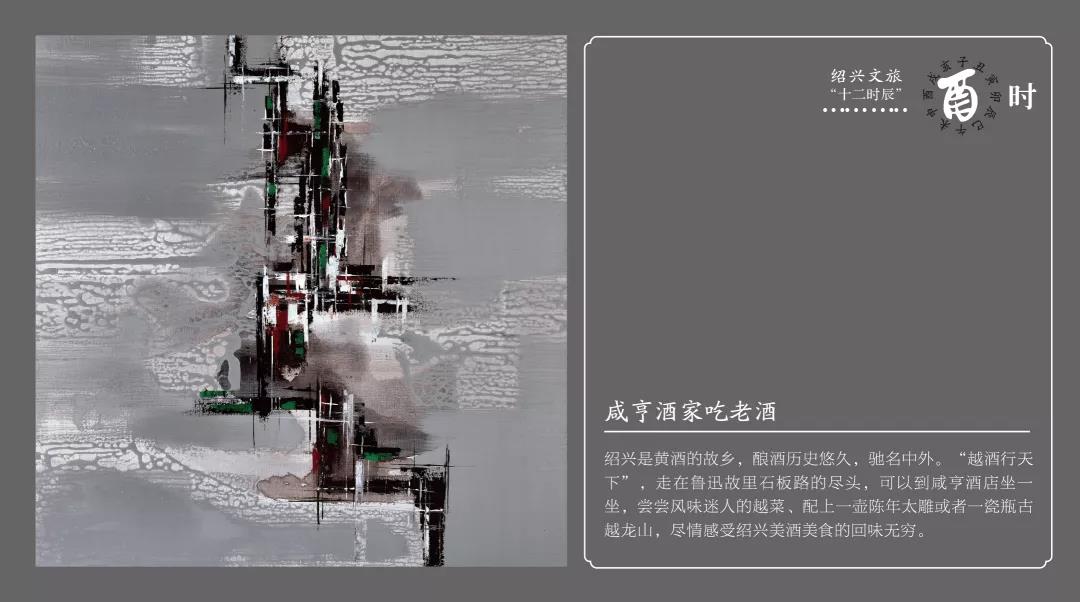
Taste the Rice Wine at Xianheng Restaurant
Shaoxing is reputed as the town of the Rice Wine. The wine brewing technique has a long history and is well-known both at home and abroad. "The Rice Wine has been introduced over the world". Walking all the way to the end of the flagstone of Lu Xun's Former Residence, you can take a short break and have some delicious food at Xianheng Hotel. It is not a bad idea to order a bottle of aged Rice Wine, either Taidiao or Guyue Longshan. It feels extremely pleasant with both the wine and the food.
Xu (19: 00-21: 00)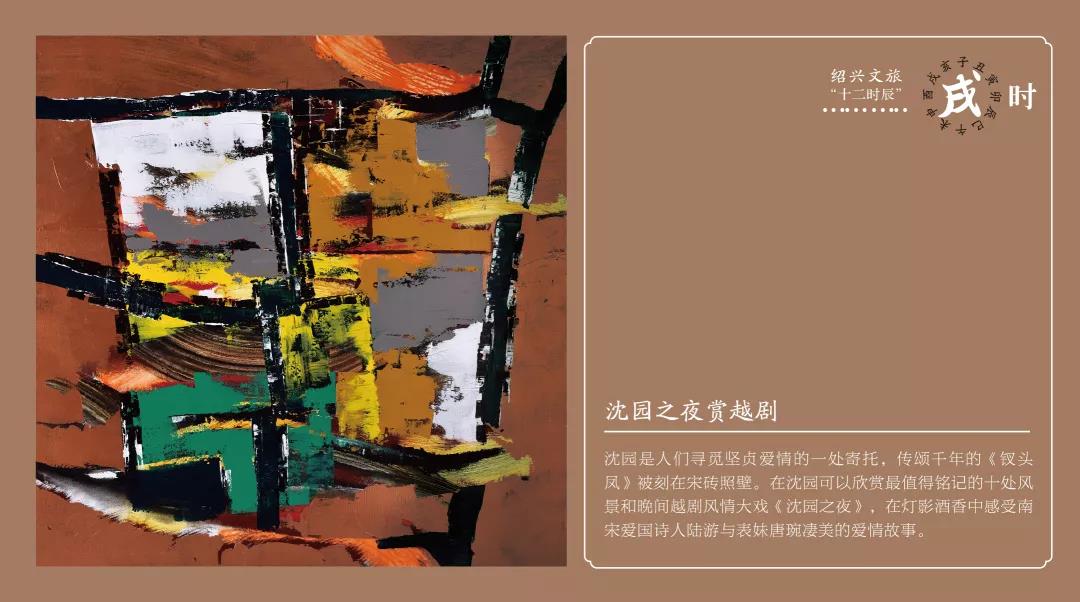
Watch the Yue Opera on the Night of Shen Yuan Garden
Shen Yuan Garden is a sacred place people entrusted for faithful love. The "Phoenix Hairpin", which has been praised for thousands of years, was engraved on the brick wall of Song Dynasty. In Shen Yuan Garden, you can enjoy the top ten landscapes and the famous Yue Opera "Shen Yuan Night". At night, you can watch the opera, have the rice wine and listen to the sad but beautiful love story between Lu You, a patriotic poet of the Southern Song Dynasty, and his cousin Tang Wan. How enjoyable it is.
Hai (21: 00-23: 00)
Take a Stroll by Didang Lakeside on Night
In Didang CBD, when night falls, the high-rise buildings in various styles are colorful and spectacular with the shining lights. At Lake Didang, you can enjoy the bright nightscape of the city, or you can take a walk after the runners.
Zi (23:00-01:00)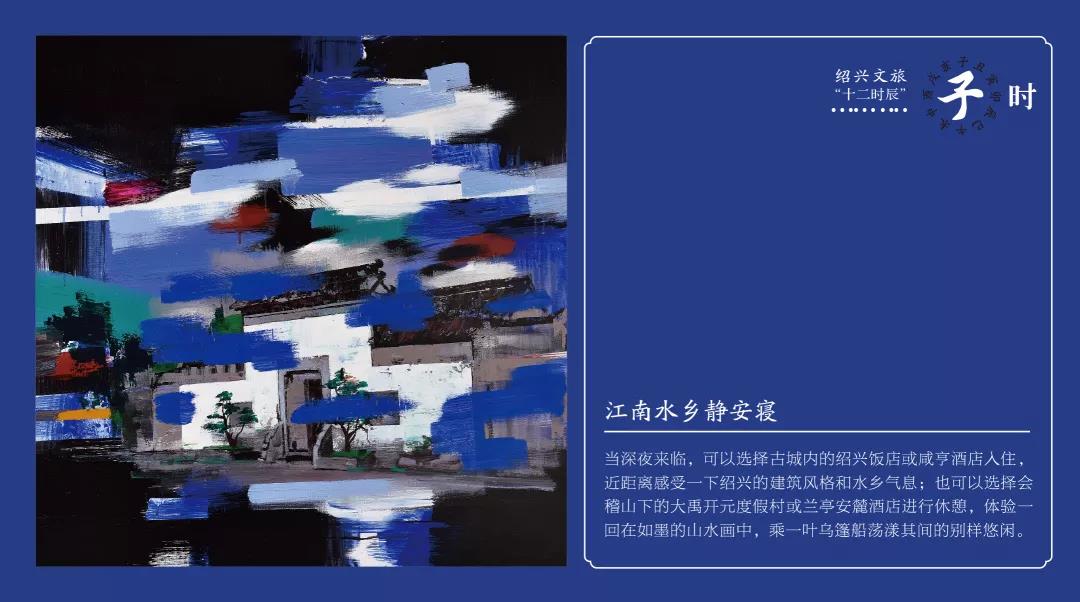
Sleep in Peace at the The Town of Water
Late at night, Shaoxing Hotel or Xianheng Hotel are strongly recommended for accommodation, where you can appreciate the ancient architectural style and have a ringside view of the ancient city known as “Town of Water”. You can also choose Dayu Kaiyuan Resort or Lanting Anlu Hotel, both of which are at the foot of Huiji Mountain, if you want to experience a different kind pleasure by taking an old-styled shed boat, sculling in the ink-like landscape.
Chou (01:00-03:00)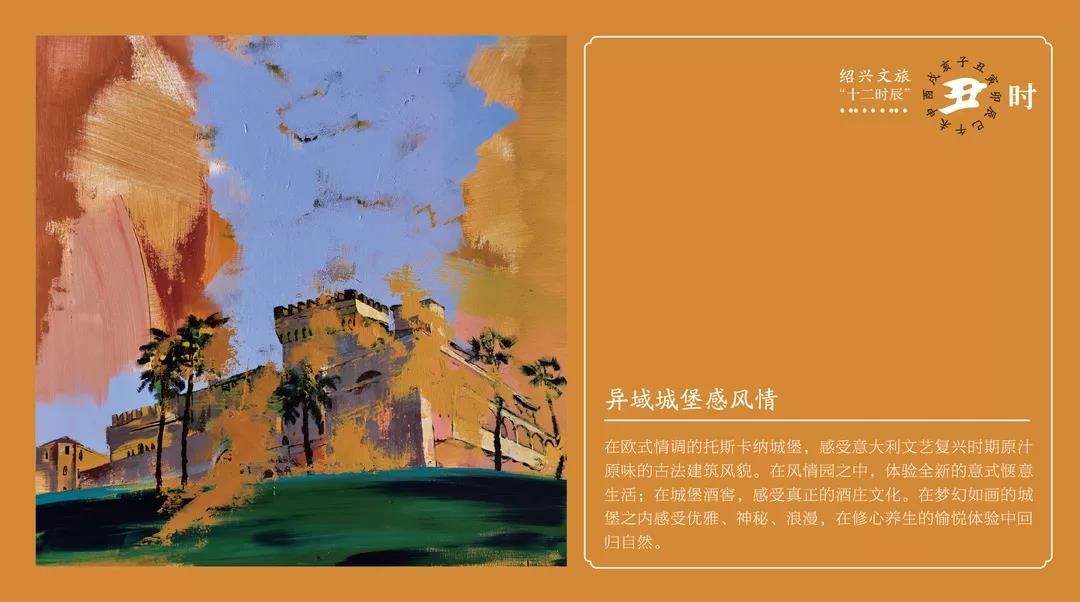
Visit Exotic Castle for Leisure
Tuscan castle stands as a testimony to the original ancient French architectural style dating back to Italian Renaissance. In the garden, you can experience a brand-new Italian style life ; In the wine cellar, you can understand the real culture of the wine. In the picturesque dreamy castle, you can feel the elegant, mysterious and romantic atmosphere that brings you back to nature. Your state of mind may get improved under such agreeable circumstance.
Yinshi (03: 00-05: 00)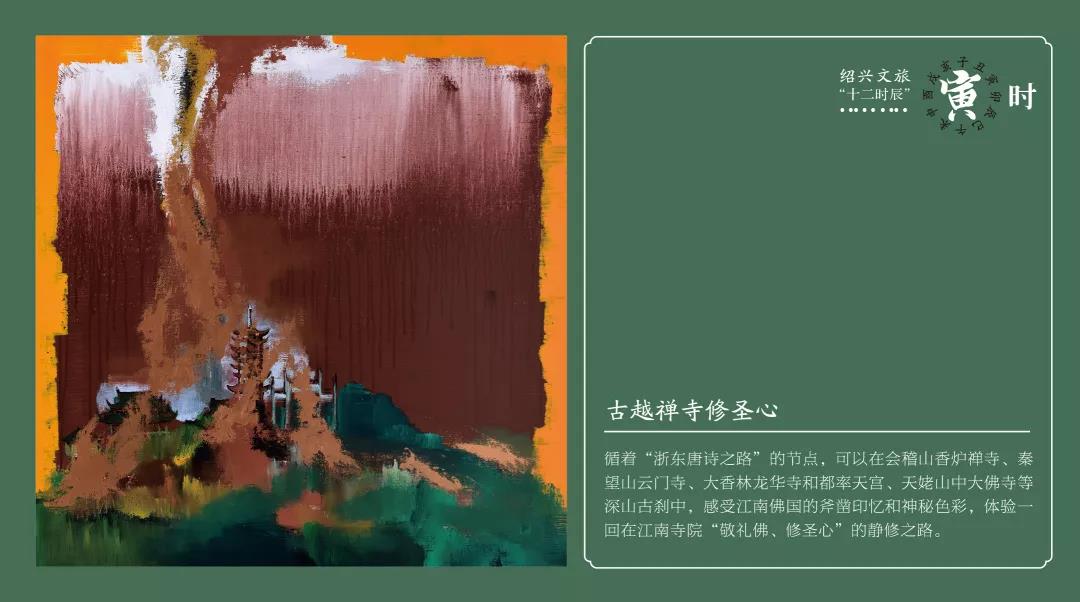
Improve Mind at the Ancient Yue Monastery
Following the route of The Tang Poetry Road in Eastern Zhejiang", you can discover the mystery of the Buddhist in the ancient temples deep in the mountains, such as the Censer Temple in Kuaiji Mountain, the Yunmen Temple in Qinwang Mountain, the Longhua Temple in Daxianglin Scenic Spot, the Great Buddhist Temple in Tianmu Mountain, etc. Saluting the Buddha and cultivating the mind are what people usually do in these temples.
(Edited and Translated by Shaoxing Research Institute of Culture and Tourism Industry)
Link to Original Chinese Web Page
http://sxwg.sx.gov.cn/art/2019/12/15/art_1647147_41183931.html)

- 0575-89180831
- 浙公网安备 33060202000378号 浙ICP备05014601号-1
- Copyright © 2020-2050 Shangwang Yanli Rural Recreation Area





